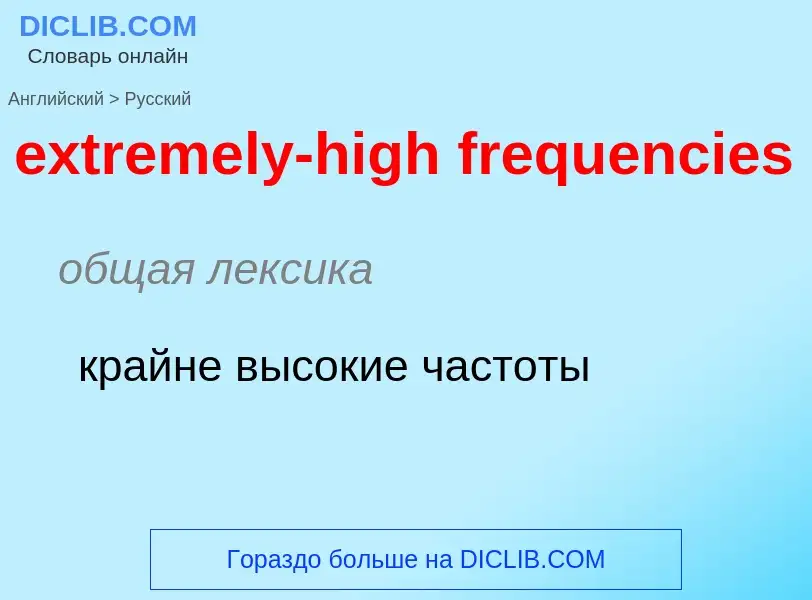Перевод и анализ слов искусственным интеллектом ChatGPT
На этой странице Вы можете получить подробный анализ слова или словосочетания, произведенный с помощью лучшей на сегодняшний день технологии искусственного интеллекта:
- как употребляется слово
- частота употребления
- используется оно чаще в устной или письменной речи
- варианты перевода слова
- примеры употребления (несколько фраз с переводом)
- этимология
extremely-high frequencies - перевод на русский
общая лексика
крайне высокие частоты
общая лексика
частота 30.000-300.000 МГц (соотв. диапазону миллиметровых волн 10 мм - 1 мм)
общая лексика
сверхнизкие частоты
Определение
Википедия

Extremely low frequency (ELF) is the ITU designation for electromagnetic radiation (radio waves) with frequencies from 3 to 30 Hz, and corresponding wavelengths of 100,000 to 10,000 kilometers, respectively. In atmospheric science, an alternative definition is usually given, from 3 Hz to 3 kHz. In the related magnetosphere science, the lower frequency electromagnetic oscillations (pulsations occurring below ~3 Hz) are considered to lie in the ULF range, which is thus also defined differently from the ITU radio bands.
ELF radio waves are generated by lightning and natural disturbances in Earth's magnetic field, so they are a subject of research by atmospheric scientists. Because of the difficulty of building antennas that can radiate such long waves, ELF frequencies have been used in only a very few human-made communication systems. ELF waves can penetrate seawater, which makes them useful in communication with submarines, and a few nations have built military ELF transmitters to transmit signals to their submerged submarines, consisting of huge grounded wire antennas (ground dipoles) 15–60 km (9–37 mi) long driven by transmitters producing megawatts of power. The United States, Russia, India, and China are the only countries known to have constructed these ELF communication facilities. The U.S. facilities were used between 1985 and 2004 but are now decommissioned.


![Typical spectrum of ELF electromagnetic waves in the Earth's atmosphere, showing peaks caused by the [[Schumann resonances]]. The Schumann resonances are the resonant frequencies of the spherical Earth-ionosphere cavity. Lightning strikes cause the cavity to "ring" like a bell, causing peaks in the noise spectrum. The sharp power peak at 50 Hz is caused by radiation from global [[electric power grid]]s. The rise of the noise at low frequencies ''(left side)'' is radio noise caused by slow processes in the Earth's [[magnetosphere]]. Typical spectrum of ELF electromagnetic waves in the Earth's atmosphere, showing peaks caused by the [[Schumann resonances]]. The Schumann resonances are the resonant frequencies of the spherical Earth-ionosphere cavity. Lightning strikes cause the cavity to "ring" like a bell, causing peaks in the noise spectrum. The sharp power peak at 50 Hz is caused by radiation from global [[electric power grid]]s. The rise of the noise at low frequencies ''(left side)'' is radio noise caused by slow processes in the Earth's [[magnetosphere]].](https://commons.wikimedia.org/wiki/Special:FilePath/Schumann resonance spectrum.gif?width=200)
![A CableFree MMW link installed in the UAE installed for [[Safe City]] applications, providing 1Gbit/s capacity between sites. The links are fast to deploy and have a lower cost than fibre optics. A CableFree MMW link installed in the UAE installed for [[Safe City]] applications, providing 1Gbit/s capacity between sites. The links are fast to deploy and have a lower cost than fibre optics.](https://commons.wikimedia.org/wiki/Special:FilePath/CableFree MMW Link installed in UAE.jpg?width=200)
![Atmospheric attenuation in dB/km as a function of frequency over the EHF band. Peaks in absorption at specific frequencies are a problem, due to atmosphere constituents such as [[water]] vapour (H<sub>2</sub>O) and molecular [[oxygen]] (O<sub>2</sub>). The vertical scale is logarithmic. Atmospheric attenuation in dB/km as a function of frequency over the EHF band. Peaks in absorption at specific frequencies are a problem, due to atmosphere constituents such as [[water]] vapour (H<sub>2</sub>O) and molecular [[oxygen]] (O<sub>2</sub>). The vertical scale is logarithmic.](https://commons.wikimedia.org/wiki/Special:FilePath/Micrwavattrp.png?width=200)
![Part of the [[Atacama Large Millimeter Array]] (ALMA), a millimeter wave [[radio telescope]] Part of the [[Atacama Large Millimeter Array]] (ALMA), a millimeter wave [[radio telescope]]](https://commons.wikimedia.org/wiki/Special:FilePath/The Atacama Compact Array.jpg?width=200)
